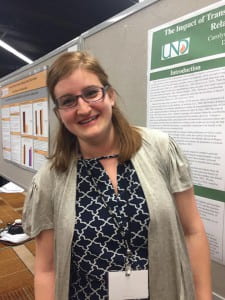 Carolyn Uhl
Carolyn Uhl
What steps did you take to get to where you are now?
- I completed my undergraduate degree at UWGB, where I majored in Psychology and Human Development.
- During my last semester at UWGB, I completed an internship at Marion House, a group home for pregnant and parenting adolescents.
- Upon graduation, I was offered full-time employment at Marion House, where I worked as a Case-Manager for around a year and half, at which time I was promoted to Program Manager for a recently opened transitional living program for homeless pregnant and parenting young mothers, especially for those aging out of the foster care system.
- As I mentioned above, I thought that one area in which I could grow in my ability to advocate for my clients was related to helping them navigate the legal system; however, I didn’t want to go to law school, so I found forensic psychology to be a great compromise.
- I applied and was accepted into the MS forensic psychology program at the University of North Dakota (UND).
- During my time in the program, my advisor encouraged me to apply for the experimental/general psychology PhD program.
- During my time in the PhD program, I focused on classes that would enhance my statistical skills, expand my knowledge of forensic psychology, and/or provide me with skills that were easily transferrable to other fields.
- During graduate school, I taught classes at UND, as well as a local technical college. However, working on my own research, as well as various research projects within my advisor’s lab, was where I learned the most. I was able to apply my classroom knowledge and study things that were of interest to me and others in the lab.
Did you enjoy your forensic psych graduate experience? Anything in particular?
- I definitely enjoyed my forensic psych graduate experience. I enjoyed my classes, conducting research, teaching, and speaking and working with classmates. I especially enjoyed working on research, especially data analysis.
What is a typical day schedule for you?
- What I currently do:
- I am currently a Research Analyst at St. Norbert College.
- As a Research Analyst, I prepare, initiate, and implement survey and other data collection and research efforts. I also help refine research questions, construct datasets, conduct statistical analyses, summarize research findings, create interactive data visualizations and dashboards, and prepare reports and presentations in support of requests from various units on campus and of accreditation efforts.
- Our office also works to support faculty, staff, student, and collaborative scholarly research efforts.
- In my free time, I conduct research on juror perceptions regarding victim culpability, cyber-crimes and the law (e.g., image-based sexual abuse), and social injustices faced by underrepresented populations.
- What I did before you moved back to this area/how I use my research skills in my current position:
- In graduate school, I chose to take courses that would best prepare me for a career conducting research.
- I focused on building my statistical skills as much as possible.
- I also sought out opportunities to enhance my research skills and took a mixed-methods course, a Ux course, a writing/publishing course, and worked with different students and faculty within the department to help get the broadest range of experiences and skills.
- These experiences helped expand my skill set and allowed me to be a more well-rounded researcher.
- What others from UND forensic psychology programs have done after finishing their education:
- Graduates from the Forensic Psychology program where I do work in many different areas.
- Some, like me, are working in data analysis and/or research capacities, some are conducting forensic evaluations under the supervisor of psychologists, some work with prisons and juvenile facilities, some work as probation services, some work as legal advocates (e.g., child advocacy centers, sexual assault centers, crisis centers), some work in social service agencies, some work in law enforcement, etc.